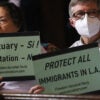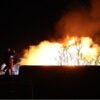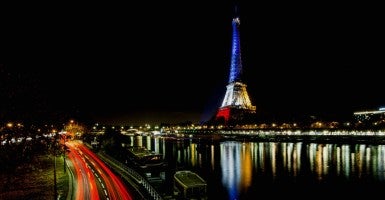“Allah chose me … to travel to Europe in order to terrorize the crusaders waging war against the Muslims.”
So begins an Islamic State magazine interview published last February with the man police now think planned the butchery in Paris. Abdelhamid Abaaoud went on to mock the European authorities who could not block his travels between Europe and Syria. He told the reporter for Dabiq of gathering weapons at a Belgian safe house, and of a trip to Syria after a firefight with French and Belgian special forces killed friends. Somehow, he got back into Europe again.
Why Paris?
“The Crusades” live, for such zealots, and Abaaoud’s reference above is typical. Normal people of dozens of faiths visit Paris to wonder at its magnificent, diverse, and ancient places of worship and to marvel; would-be “jihadis” marvel anew at the conquests of the Mohammadans in the seventh, eighth, and ninth centuries; the rejoinder and imperialism of the medieval Christian crusaders; and some later Muslim army appearances at the gates of Western cities such as Vienna and Budapest.
France and French kings birthed many a crusade. St. Denis, the gray and grim urban Parisian neighborhood of so much attention these days, used to be better known for its abbey, rebuilt by Abbot Suger to be the first true example of gothic architecture. It is dedicated to Denis, patron saint of France.
ISIS favors “a war of civilizations,” and Paris provides one symbol after another, as well as guaranteed media coverage. The French do not want a war of civilizations, but “civilization” they do represent. ISIS distinguishes itself by burning Shia mosques, wrecking Christian churches, and hacking apart ancient statues all over Syria and Iraq—filming it all for its periodicals. No one should expect these people to miss out on a trip to Paris.
A second reason for the violence in Paris is that, beginning in the 1950s, the militants’ forbears fled there. They left places that were worse, or fled from war, or just hoped for something better. But their young did not experience any of the old trauma, so now they feel free to hate where they are and what’s been given them.
For example, Algeria endured French colonial war, and afterward rule by the National Liberation Front (FLN), which massacred tens of thousands of their countrymen and founded a fierce one-party state. During the 1990s, indigenous Islamists slashed their way through the Algerian population before losing that civil war. So few emigrants now in France want to return to Algeria.
Abaaoud’s roots were in Morocco, making this terrorist one of many young men who are stuck in Euro-cities, alienated and lost between cultures.
A third cause is the life they have in those plain suburbs and apartment towers that seem like ghettos. There are policing troubles. Unemployment can be shockingly high. French laws block the wearing of headscarves for girls in class. After debates over that law, and a police shooting in 2005, mobs burned thousands of automobiles all over Paris—not the vision one wants in “The City of Light.” There are limits to this city, even if it is called the most glamorous in Europe.
The fourth reason is what hot-headed periodicals and some imams see as the libertine ways of Western cities such as Paris. How can a narrow sect that bans music and dance tolerate the American heavy metal group that was rocking the concert hall where so much murder took place? Reportedly, ISIS’ statement after the recent mayhem included a slur on Paris as “a capital of prostitution and obscenity.” Only once in Paris did I see overt trafficking, along the Rue St. Denis in Paris. If I felt shock, passing on my way to the old abbey, imagine the daily shock for the devout, or the unlicensed killers who say they are devout, who want all “their” women covered in public.
Reason No. 5 is that France, like most of NATO, is fighting ISIS in its Syrian-Iraqi homeland. Just as Paris was bombed with plastiques by FLN agents in the late 1950s, ISIS is opening up second fronts against its enemies: Russia (for basing air, sea, and land forces in the Levant) and Lebanon (with neighborhoods run by Shia Hezbollah, which Sunni terrorists consider apostates). France is attempting to obstruct the new “caliphate” of Al Baghdadi, so ISIS attacks with the weapons at hand. When FLN was rightly called a terrorist organization for bombing dance halls and cafes in the ’50s, it rejoined, “If we had airplanes like you we’d bomb with those.” Still, it won, beating a nuclear power with a permanent seat on the United Nations Security Council. If terrorist leaders such as Yasser Arafat studied such results, why wouldn’t ISIS?
But the open, democratic, civil Paris will not be snuffed out. Paris survives. It prevailed over anarchist bombings in the 19th century that sometimes left streets empty and shops shuttered. Paris deserves its life, in part because it shares it generously with a lucky world. Travelers and citizens alike, including many moderate and well-read Muslims, have had transformative aesthetic and intellectual experiences in Paris.
“Vive la République!”
This story was originally published in the Philadelphia Inquirer.































